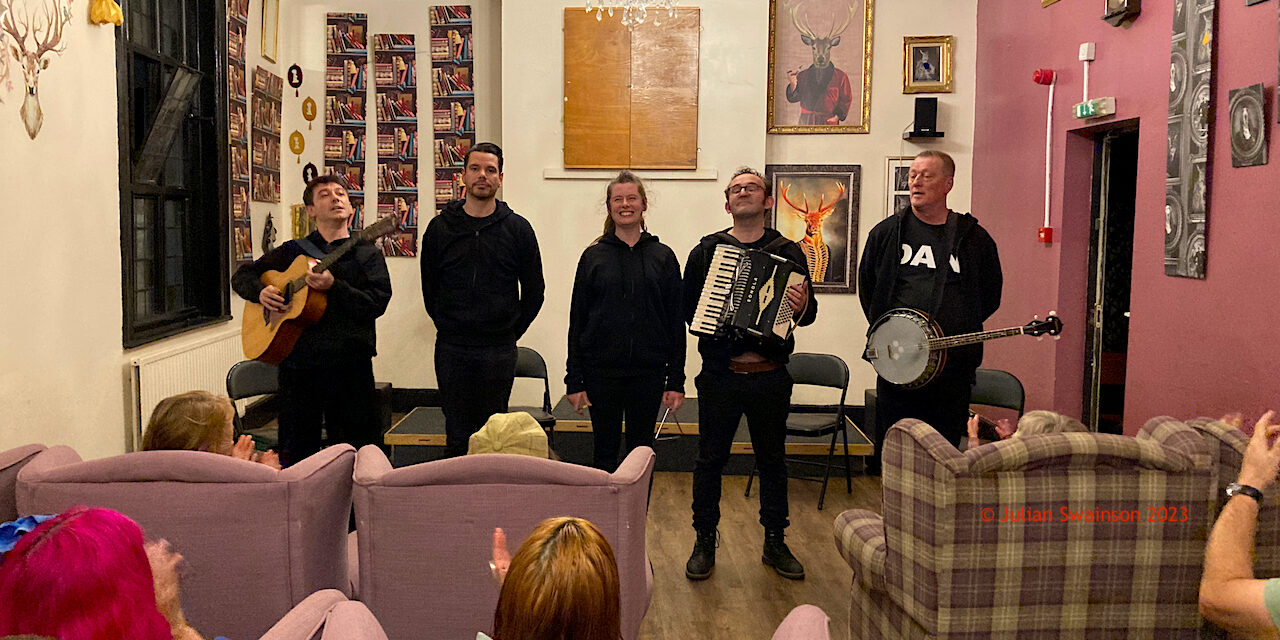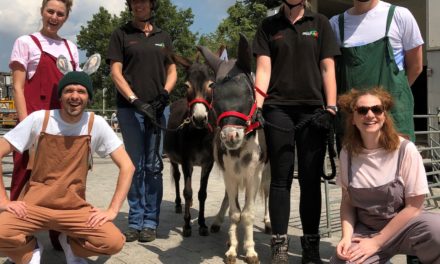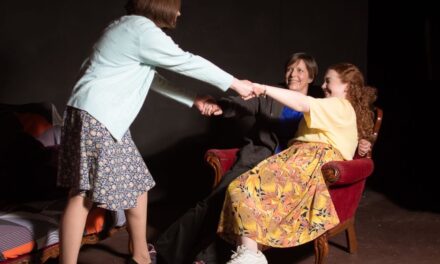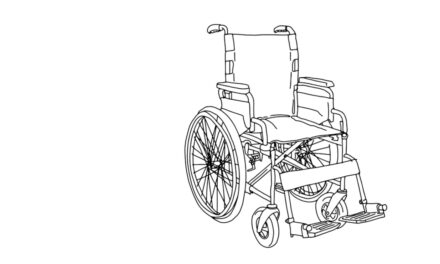Jack, Sam, Hatty, Joey and Chris – Photo © Julian Swainson 2023
I got the invitation to review this show just a few hours before the performance, and I was very pleased to be able to see it. The call was from the energetic Simon Floyd who is well known from his work with The Common Lot and many community projects in Norwich. He is the director of this fine bit of theatre.
This show is theatre with a purpose – it is aimed at both social care practitioners and anyone involved with the challenges of fatherhood and it looks with unrelenting precision at the real lived experiences of fathers who have had interaction with social services. It has a wide ranging message but it is set in a rural Norfolk context so it reflects the predominantly white working class population in the named communities, but the themes are universal.
The work is presented in one intense 75 minute act, punctuated by music from the five performers to top and tail the show and separate the stories of each of the four dads we meet. One woman and four men give us a breathtaking variety of characters all clearly identified. The dialogue is fast, as we have a lot to get through as we look at the experiences of troubled fatherhood of four men from different backgrounds. We see their childhood traumas which may play a part in their later mistakes, their stumbling steps into relationships where their physical maturity is some way ahead of their emotional development and their widely varied reactions to the resulting offspring.
This show has a lot of humour, but is also rather intense: I admit to stifling an urge to laugh out loud when clearly nobody else in tonight’s audience was laughing. The music is great, and gives momentary relief from the sometimes difficult themes of the play.
Hatty Ashton as the only female cast member has perhaps the most spectacular range of characters to encompass, as most (but by no means all) of the hapless blokes’ partners, girlfriends, mothers, daughter, nans and even a disturbingly memorable distressed baby. The first dad is Dan (Chris Dickerson) who presents as the sort of bloke with anger management issues that you would cross the road in front of traffic to avoid eye contact with. Brutalised by his father he has left a trail of infants with numerous partners who are often as unfit as him to be parents. Slowly coming to a more mature understanding he finds his past means a huge struggle to be taken seriously as a father by care workers. Joey Herzfeld plays Will, who comes from a middle class background, has the best of intentions but struggles to fit in with the expectations on him and the demands of his children.
Sam Dunning gives us Steve, who appears confident and successful from a stable family background. He meets childhood flame Abby but their freewheeling casual affair is suddenly complicated by the arrival of baby Charlotte. A second child follows, but they are too young to cope. She takes to the bottle, he seeks solace in a workplace affair then leaves her. As the children’s lives deteriorate, social services take over. Jack Fisher brings us Lee, who has grown up in care homes and could be considered to have had the worst possible childhood from which to become a stable parent. Yet he meets Stacy, also from a care background and at just 21 they are about to become parents. Lee’s story is presented in a downbeat way, but is actually the most positive and hopeful account as the play ends.
These contrasting stories are thought provoking. As a (far from perfect) father myself there are some uncomfortable moments that challenge my behaviour at times in my life. I suspect every father in the room felt that too. For those in the business of intervention it also gives some real challenge, particularly to the (too frequent) assumption that a troubled parent can never improve. It is a play full of the warmth of humanity even as we see people suffering the collapse of everything that matters in their lives. Perhaps above all it reminds us that it takes a whole community to raise a happy child and that parents in all walks of life need help and we need to do more than turning away and saying ‘that’s a problem for the social workers’.
This powerful show should be widely seen by those involved with parenting, including teachers, social work staff and directors, courts and police. But it would also be good for those about to commit to being a parent to see. For a troubled young father this show could be an eye opener. It also reminds us that even the most rejected in society are human beings with needs and aspirations. The show is being performed as a free show (see dates below) and I strongly recommend that you see it. The pace and quality of acting are both excellent, with rapid fire delivery of complex dialogue. The script has been edited to efficient perfection, giving a memorable and moving theatrical experience.
I cannot finish without some reference to the venue for this preview, upstairs in the Louis Marchesi pub in Tombland. This space could be a metaphor for social work under thirteen years of clueless government. A basically impressive and elegant historical structure is now run down and poorly maintained, with festering patches of ceiling mould and flickering electrics, a shambling mess of ill-assorted furniture and some serious access issues! The room has elegant leaded light windows on one side and possibly the naffs artwork ever seen on the wall opposite. Bizarre.
© Julian Swainson, Norwich Eye, 4th October 2023
How’s Your Father by Floyd Performance is at Norwich Arts Centre 5th October; Great Yarmouth Library on 6th October; The Hunter Club, Bury on 18th Oct; Lowestoft Library on 19th Oct and Chantry Library in Ipswich on 2nd November
Look up Mr Floyd for further information.






Recent Comments